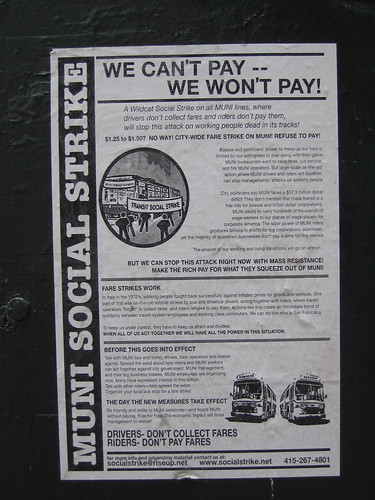August 20, 2005
In which we can't pay and we won't pay!
The organisers of a social strike against MUNI have this to say:
... over $9 million was "discovered" for Muni in late May. The SF Board of Supervisors, according to an article on BeyondChron.org, "could have stopped the 25 cent fare increase simply by restoring the parking fine and fee increased to the levels originally proposed in the MTAs budget." They didn't. And about half of the $9 million was used to reduce fees for parking and fines.A few supervisors are friendly to the interests of working class people, but that’s not enough. It is decisive action by the riders themselves that will turn heads -- and the table.
The businesses that benefit most from Muni should pay. Downtown San Francisco, long a haven for tax evaders and enemies of people in the city, needs to pay for what it uses. Muni functions as a lifeline for those companies, bringing countless people to their service sector jobs that are generally underpaying them anyway. Corporate America's billions in revenue makes its claims of poverty ring hollow.
and Common Ground magazine says this:
... a fare hike is an attack on the jobless, carless and fixed-income poor (MUNI fares have shot up 50% in the past two years). “Studies show that raising fares and cutting services drives customers away,” notes Jeremy Nelson of Transportation for a Livable City (). A look at the scheduled cuts reveals how MUNI places corporate interests before community needs. Cutbacks have targeted cross-city routes, residential service and weekend travel while sparing the commute-hour traffic that delivers the daily workforce to the steps of the companies like Chevron, Bank of America, Wells Fargo, Bechtel and the Carlyle Group. “The real problem is that mass transit is a jumbo-sized free ride for the bosses and billion-dollar corporations,” Keven Keating argued in the March edition of Fault Lines, the Indymedia tabloid.
Note that the Mr Nelson quoted now works in the private sector for transit consultancy Nelson\Nygaard.
Goddammit, MUNI is raising fares again. Glad I am that I have a stash (of tokens). $1.50 from $1 in three years. This comes at a harsh time, consider the recent quarterly audit of MUNI shows that they have an appalling on-time record and no feasible plan to improve capacity or meet headway.
